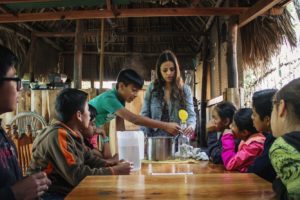The entire world is going through a series of unforeseen circumstances due to the COVID pandemic. None of the current generations had experienced a similar situation, forcing the world to stop and to reformulate and reinvent the practices that we used to feel safe and immovable.
We are facing the uncertainty of what the future brings, and of course, in education, this has also generated a series of new situations; the most common being having to move from the classrooms into digital platforms, having to assign large amounts of homework, and compliance with routines, that keep children under a structure similar to what was in the prior normality. Do these measures represent the best for our students? We will not know the consequences until the effects appear, although some of these are already evident.

If the entire world, the economy, the social, work, family, and the emotional life of adults have taken a violent turn, we cannot imagine how things have changed for the children; they, just like the adults, are living an atypical moment. They are not exempt from the world situation, and it would be a mistake to try to keep them under a routine equal to or even more rigorous than the one they already followed before. Of course, in Waldorf pedagogy, the rhythms during the day are of high importance as it is to help the children having a healthy breathing routine, which is now provided by the parents.
Our way of working had never contemplated adapting the classroom to technological approaches. However, this situation has led us to adopt ways we did not find appropriate before. We have adjusted to the circumstances and are now using different platforms to keep the contact as personal as possible, sometimes only having the opportunity to share some words, some others having the joy of listening to our voices, what a precious gift.
The first-hand work of each of the Escuela Caracol teachers has come into the hands of each of their students in Lake Atitlán, as we still trust and believe that the relationship must be a living relationship. Each teacher continues to find ways to reach the students by creating its materials, planning what is appropriate for each of the students, and maintaining connections that seek to be more than just educational content; attempting to keep the image of their beloved influence alive in the child, of his school which is his community, and of the beauty in doing, thinking, and feeling.
I would think that, for a Waldorf Teacher, working remotely is a great challenge, but on the other hand a reaffirmation of the work that he has been doing along the way with his students. Personally, I am completely sure that my students expect and work with the same dedication they did before, that they have such a solid way of free-thinking and creating, that they continue to work alone without any missteps, under the echo of what we forged with so much love during the last few years in school.
This situation highlights many of the things that we must improve as humanity, but also reaffirms much of the good work we have done. Although we never neglected to academically forge our children, this was never the only priority. We always kept the firm idea of feeding the child in other spheres, the human, the emotional. Both, parents and teachers, have agreed to this, and it is precisely what we are looking for in the current crisis because our children will not remember from this pandemic how many tasks they did, they will remember the relationship that remained with their teacher, and the strong desire to go back to school and share the things they learned at home.
In the distance, each teacher continues as a solid image in the child’s mind, a shore to hold and return to, because we have maintained a very real and lively relationship, despite the virtuality.
Carmen María Alvarado Benítez
Sixth grade teacher
Escuela Caracol


